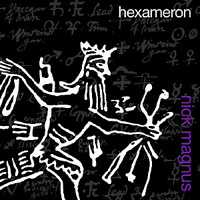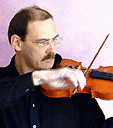HEXAMERON
|
|
Price
£11.99 + postage & packing:
|
|
|
|
Singularity (7'45") |
GUEST MUSICIANS
|
Steve Hackett - guitar |
|
John Hackett - flute |
|
Geoff Whitehorn - guitar |
 |
Pete Hicks - vocals |
 |
Tony Patterson - vocals |
|
Siobhan McCarthy - vocals |
|
Debi Doss - vocals |
|
Clare Brigstocke - vocals |
|
Ninian Boyle - violin, viola |
|
Melvyn Hiscock - slide guitar |
REVIEW EXTRACTS
'Hexameron' is one of the best symphonic progressive rock albums I have ever heard... a CD that won't be leaving my player for weeks and will find its way back for years to come. It is a "must buy" for any lover of symphonic progressive rock. - Marc Roy, proGGnosis
'Hexameron' is a must for all lovers of great progressive rock music... . If you listen to 'Dancing on the Waters' and 'Marduk' you know what I mean. Just awesome. - Henri Strik, Background Magazine
This CD is the best, the most beautiful album I have heard in the past 13 years... The guitar playing of Steve Hackett is sober as well as sublime and brings back memories of “Voyage of the Acolyte”... - Walter Haentjens, Prog-Nose.org
Nick has produced another stunning album; a polished diamond of musical genius which his fans will lap up... 'Sophia's Song' is a truly glorious track with lush, crisp instrumentation and if you do not fall instantly in love with Siobhan's voice then you are deaf or dead… or both! 'Seven Hands Of Time' displays the talents of Mr Hackett senior with some stunning wailing guitar that evoke the vastness of time and space alongside Nick's glorious keyboard playing and effects - without doubt one of the best instrumental performances I have heard for along time. Both Nick and Steve are in fine form here. - Alan Hewitt, The Waiting Room
I love this album. I think you will too. As will any progressive rock fan, that has a taste for great symphonic prog with a certain Genesis influence... A track with the title 'Marduk' says it all, great lyrics, and one of the album’s finest songs. - Bjørn Nørsterud, Scream Magazine. Prog Album of the Month, September 2004
The final track 'The Power of Reason' is a dramatic ending to the album, with a beautiful choir leading to the amazing soprano voice of Clare Brigstocke and John Hackett's flute. It's a track that builds up to a tremendous ending, with, whom else, but Steve Hackett taking on the lead guitar mantle in front of the exciting Magnus keyboard work. It's a neck-tingler... - Martin Hudson, Classic Rock Society Magazine
'Hexameron' is a journey of prog ecstasy... For me, that journey starts in the present day, swiftly jumping back to the late 70's to the time when only a few mainstream prog bands held onto their musical integrity, delighting the faithful who, like now, relish relinquishing themselves to powerful emotional melodies... As I stated at the start of this review, just buy it. This is one stunning album. If you are a Hackett fan, you must also be a Nick Magnus fan. - Jem Jedrzejewski, The Hairless Heart Herald
As an example of classic symphonic prog, ‘Hexameron’ is in a class of its own... Think of this as a journey - close your eyes and imagine what it would be like to start off, at first going through scenery you have not seen before yet which is somehow familiar, as the travelogue continues through more obvious points of reference, until, at the very end, the person or thing or place that you would have crossed deserts, rode oceans and flown skies for, finally appears... an awe-inspiring climax that will leave you jaw-dropped in amazement. - Andy Garibaldi, CDS.
NICK ON HEXAMERON - AN INTERVIEW
How did you get to 'Hexameron' from your earlier
albums?
Really the progression is from 'Inhaling Green', in particular
the title track. The other tunes - well, there are some musical themes that
stretch between them, but 'Inhaling Green' can be seen as three separate pieces
of music that are interconnected and related to each other because there's an
underlying concept.
So would you say 'Hexameron' is a concept
album?
Absolutely, yes. It is a concept album, and I like to think of
it as a prequel, in some ways, to 'Inhaling Green'.
Why a concept album?
Writing 'Inhaling
Green', I found myself using very different thought processes to those that
I'd used previously writing, you know, individual, stand-alone pieces of music.
Having a narrative idea in your mind, it's a bit like television or film, where,
if you're writing to a particular scene, the way it's edited suggests a rythym
to you, and the mood suggests a melody and tonal colours. You write music in
a very different way, when you've got that kind of filmic idea in your mind.
Previously, I'd sit down at a keyboard and just play around and improvise until
ideas came up that I liked, which I'd then make a note of and come back to later,
work on them and turn them into a larger piece. But it's a much more linear
process when you're doing it from a concept point of view. You don't put ideas
aside in quite the same way and come back to them. You tend to flesh them out
at the time. And they lead to other ideas, and ultimately you land up writing
something that you simply wouldn't have done without a concept in mind. That's
what happened with 'Inhaling Green', and I found I really, really liked doing
it that way. Not only did the ideas come more easily, but I found it was suddenly
possible to do what I'd previously found very, very difficult, which was to
write longer pieces. Suddenly it was a question of having to edit them down
rather than flesh them out! So after that experience, I thought I would
like to do a whole album as a concept.
You mentioned film - your work has been described
as "movies for the ears". Is this something you consciously strive
for?
Yes, it is. Much of my favourite music these days tends to be movie
sound tracks. I've always loved composers like John Williams, Jerry Goldsmith
and Hans Zimmer. They do very, very big broad cinematic scores
and, while I can only dream to equal what they do, I can at least attempt to
get that idea across in a prog rock context, or a progressive context - that
is, according to my own definition of the term ‘progressive’.
So how do you see 'Hexameron' fitting into
that progressive context?
Well, I think it comes down to musical categories.
Everything gets divided into categories, and those categories get subdivided
into yet more categories. In the 70s prog rock was, pretty much, a category
in itself. Nobody bothered trying to label Yes, Genesis,
ELP or Gentle Giant as different genres. They were just prog rock. Nowadays, it gets subdivided into
synth, electronic, electronica, symphonic metal, heavy metal, prog, goth groove,
neo - handbag, garage, thrash...!! I don't know where other people think my music
fits into this, but I would generally call it a sort of hybrid of prog rock
and what used to be called symphonic rock. It's a very difficult question to
answer - to find the right words to describe it. Without wanting to be so bold
as trying to invent a new category - but I'm going to anway! - I think it's
an attempt to blend the more rocky aspects of prog rock with the more extreme
symphonic elements seen over the years in bands like The Enid. So one minute
you're in a loud, guitar-driven, up-tempo section, and the next moment you're
drifting in space with a beautiful, panoramic wash of sound. And all the time
I'm really striving hard to get melodies in there, melodies and structure. So
that, while there are moments of improvisation, they're moderately brief. Mainly
it's very structured and the melodies are interrelated. You'll find themes being
re-used throughout the whole album in a very symphonic style, a style of writing
that takes two or three themes and develops them, really works on them to the
point where you may not even realise they are being re-used and re-invented
- almost a classical approach. That may come across as sounding a little pompous, but it's an
idea
that's becoming increasingly important for me: this sense of cohesion across a whole project.
Of course, it's not necessary for all music to be like that - but for a concept album, a sense
of continuity thoughout the whole
piece can only be a good thing.
Lyrics are a new departure for you in this
album...
Yes, in the past I've done wholly instrumental tracks, but as
time goes on, you grow and develop, hopefully! A couple of years ago, I embarked
on a song-writing project with lyricist, Dick Foster. The kind of music that
came out was so different that I thought it would be nice to integrate the two
approaches. Not only does it give a whole new aspect that hadn't been there
in previous albums, it also seemed a good idea as well to help propel the narrative
more effectively, to have some lyrics to help tell the story.
Some things are not so new though... One of
the vocalists is Pete Hicks, and there are guest performances by Steve Hackett
and John Hackett - something of a reunion going on here?
Well,
all four of us are not performing together at any one time on the album, though
the first and last tracks do have Steve, John and I all playing together. Those
tracks did feel a bit like a reunion, I suppose, because it's two-thirds of
the original Hackett live band from '78 through to '80, and maybe people
will be interested in hearing an album with all of us on as we are today. I've
been working on and off with John since that time anyway. We're always playing
on each other's projects - John was on 'Inhaling Green'. I hadn't worked with
Pete since the live band split up in 1980, but it was as if no time had passed
at all. We just picked up where we left, and had a fantastic time. It was the
same with Steve. He really enjoyed himself, worked incredibly hard and did all
of those things that only Steve can do!
You discussed the advantages of
a concept album for the composer - how about for the listener?
For listeners,
I hope that they feel they're being taken on a journey, that there's a story.
And that by the time they come to the end of the album they should feel a sense
of "aaah! We're there!", we've got somewhere, there's an ending. You've
been to a whole lot of places on the way, and some of those remind you of places
you've already been, just like in real life. In terms of what that narrative
is, 'Hexameron' does have its own underlying concept, but I'd like to think
that everyone will find a story in it for themselves.
Home | Solo Albums | Biography | Discography | Blogs | Shop | Links | Contact








